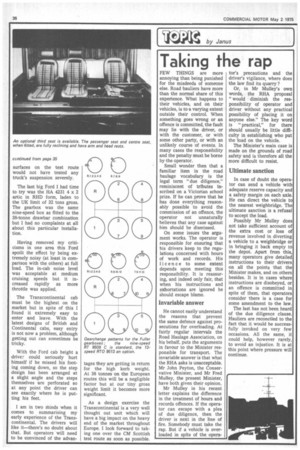Taking the rap
Page 38

If you've noticed an error in this article please click here to report it so we can fix it.
FEW THINGS are more annoying than being punished for the misdeeds of someone else. Road hauliers have more than the normal share of this experience. What happens to their vehicles, and on their vehicles, is to a varying extent outside their control. When something goes wrong or an offence is committed, the fault may lie with the driver, or with the customer, or with some other party, or with an unlikely course of events. In many cases the responsibility and the penalty must be borne by the operator.
Small wonder then that a familiar item in the road haulage vocabulary is the legal term "due diligence," reminiscent of tributes inscribed on a Victorian school prize. If he can prove that he has done everything reasonably possible to avoid the commission of an offence, the operator not unnaturally believes that any case against him Should be dismissed.
On some issues the argument works. The operator is responsible for ensuring that his drivers keep to the regulations concerned with hours of work and records. His Ii dente to some extent depends upon meeting this responsibility. It is reassuring, and indeed only fair, that when his instructions and exhortations are ignored he should escape blame.
Invariable answer
He cannot easily understand the reasons that prevent the same defence against prosecutions for overloading. At fairly regular intervals the Road Haulage Association, on his behalf, puts the arguments in favour to the Minister responsible for transport. The invariable answer is that what the RHA asks is unacceptable. Mr John Peyton, the Conservative Minister, and Mr Fred Mulley, the present Minister, have both given their opinion.
Mr Mulley in his recent letter explains the difference in the treatment of hours and records offences. If the operator can escape with a plea of due diligence, then the driver is next in the line of fire. Somebody must take the rap. But if a vehicle is overloaded in spite of the opera tor's precautions and the driver's vigilance, where does the law find its quarry ?
Or, in Mr Mulley's own words, the RHA proposal "would diminish the responsibility of operator and driver without any practical possibility of placing it on anyone else." The key word is " pradtical," for there should usually be little difficulty in establishing who put the load on the vehicle.
The Minister's main case is made on the grounds of road safety 'and is therefore all the more difficult to resist.
Ultimate sanction
In case of doubt the operator can send •a vehicle with adequate reserve capacity and a safety margin on each axle. He can direct the vehicle to the nearest weighbridge. The ultimate sanction is a refusal to 'accept the load.
Possibly Mr Mulley does not take sufficient account of the extra cost or loss of revenue involved in diverting a vehicle to a weighbridge or in bringing it back empty to the depot. Apart from this, many operators give detailed instructions to their drivers on all the points that the Minister makes, and on others besides. It is in cases where instructions are disobeyed, or an offence is committed in spite of them, that operators consider there is a case for some amendment to the law.
The last has not been heard of the due diligence clause. Hauliers are reconciled to the fact that it would be successfully invoked on very few occasions. All the same, it could help, however rarely, to avoid an injustice. It is at this point where pressure will continue.
























































































































